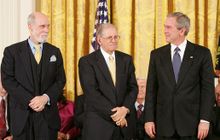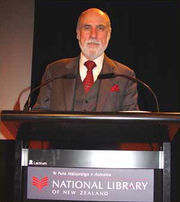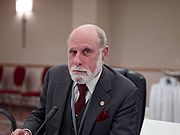Vint Cerf
| Vinton Cerf | |
|---|---|
 Vint Cerf in Bangalore, February 2007.
|
|
| Born | June 23, 1943 New Haven, Connecticut |
| Residence | USA |
| Citizenship | United States of America |
| Fields | Computer science |
| Institutions | IBM,[1] UCLA,[1] Stanford University,[1] DARPA,[1] MCI,[1][2] CNRI,[1] Google[3] |
| Known for | TCP/IP Internet Society |
| Notable awards | National Medal of Technology Presidential Medal of Freedom Turing Award |
Vinton Gray "Vint" Cerf[1] ( /ˈsɜrf/; born June 23, 1943) is an American computer scientist who is the "person most often called the father of the Internet".[2][4] [5] His contributions have been recognized repeatedly, with honorary degrees, and awards that include the National Medal of Technology,[1] the Turing Award,[6] the Presidential Medal of Freedom,[7] and membership in the National Academy of Engineering.
In the early days, Cerf was a program manager for the United States Department of Defense Advanced Research Projects Agency (DARPA) funding various groups to develop TCP/IP technology. When the Internet began to transition to a commercial opportunity during the late 1980s,[8] Cerf moved to MCI where he was instrumental in the development of the first commercial email system (MCI Mail) connected to the Internet.
Vinton Cerf was instrumental in the funding and formation of ICANN from the start. Cerf waited in the wings for a year before he stepped forward to join the ICANN Board. Eventually he became the Chairman of ICANN.
Cerf has worked for Google as its Vice President and Chief Internet Evangelist since September 2005.[3] In this function he has become well known for his predictions on how technology will affect future society, encompassing such areas as artificial intelligence, environmentalism, the advent of IPv6 and the transformation of the television industry and its delivery model.[9]
Cerf also went to the same high school as Jon Postel and Steve Crocker; he wrote the former's obituary. Both were also instrumental in the creation of the Internet as we know it (see articles).
Contents |
Career
Cerf's first job after obtaining his B.S. degree in Mathematics from Stanford University was at IBM, where he worked for less than two years as a systems engineer supporting QUIKTRAN.[1] He left IBM to attend graduate school at UCLA where he earned his M.S. degree in 1970 and his Ph.D. degree in 1972.[10] During his graduate student years, he studied under Professor Gerald Estrin, worked in Professor Leonard Kleinrock's data packet networking group that connected the first two nodes of the ARPANet,[11] the predecessor[11] to the Internet, and "contributed to a host-to-host protocol" for the ARPANet.[12] While at UCLA, he also met Robert E. Kahn, who was working on the ARPANet hardware architecture.[12] After receiving his doctorate, Cerf became an assistant professor at Stanford University from 1972–1976, where he conducted research on packet network interconnection protocols and co-designed the DoD TCP/IP protocol suite with Kahn.[12]

Cerf then moved to DARPA in 1976, where he stayed until 1982.
As vice president of MCI Digital Information Services from 1982–1986, Cerf led the engineering of MCI Mail, the first commercial email service to be connected to the Internet. Cerf rejoined MCI during 1994 and served as Senior Vice President of Technology Strategy. In this role, he helped to guide corporate strategy development from a technical perspective. Previously, he served as MCI's senior vice president of Architecture and Technology, leading a team of architects and engineers to design advanced networking frameworks, including Internet-based solutions for delivering a combination of data, information, voice and video services for business and consumer use.
During 1997, Cerf joined the Board of Trustees of Gallaudet University, a university for the education of the deaf and hard-of-hearing.[13] Cerf is hard of hearing.[14]
Cerf joined the board of the Internet Corporation for Assigned Names and Numbers (ICANN) in 1999, and served until the end of 2007.[15]
Cerf is a member of the Bulgarian President Georgi Parvanov's IT Advisory Council, a group created by Presidential Decree on March 8, 2002.[16] He is also a member of the Advisory Board of Eurasia Group, the political risk consultancy.[17]
Cerf is also working on the Interplanetary Internet, together with NASA's Jet Propulsion Laboratory. It will be a new standard to communicate from planet to planet, using radio/laser communications that are tolerant of signal degradation.[18]
During February 2006, Cerf testified before the U.S. Senate Committee on Commerce, Science, and Transportation's Hearing on “Network Neutrality”.[19] Speaking as Google's Chief Internet Evangelist, Cerf blamed the anticompetitive intentions and practices of telecommunications conglomerates like Comcast and Verizon for the fact that nearly half of all consumers lack meaningful choice in broadband providers.[20] Google made a bid in 2006 to offer free wireless broadband access throughout the city of San Francisco in conjunction with Internet service provider Earthlink, Inc.[21] Vertically-integrated telecommunications incumbents like Comcast and Verizon opposed such efforts on the part of Silicon Valley firms like Google and Intel (which promotes the WiMax standard) as undermining their revenue in a form of "unfair competition" whereby cities would violate their commitments to offer local monopolies to telecommunications conglomerates.[22] Google currently offers free wi-fi access in its hometown of Mountain View, California.[23]
Cerf currently serves on the board of advisors of Scientists and Engineers for America, an organization focused on promoting sound science in American government.[24]
Cerf is on the board of directors of StopBadware, a non-profit anti-malware organization that Google has supported since its inception as a project at Harvard University's Berkman Center for Internet & Society.[25][26]
Cerf is on the board of advisors of The Hyperwords Company Ltd of the UK, which works to make the web more usefully interactive and which has produced the free Firefox Add-On called 'Hyperwords'.[27]
During 2008 Cerf chaired the IDNAbis working group of the IETF.[28]
Cerf was a major contender to be designated the nation's first Chief Technology Officer by President Barack Obama.[29]
Awards and honors
Cerf has received a number of honorary degrees, including doctorates, from the University of the Balearic Islands, ETH in Switzerland, Capitol College, Gettysburg College, George Mason University, Marymount University, University of Pisa, University of Rovira and Virgili (Tarragona, Spain), Rensselaer Polytechnic Institute, Luleå University of Technology (Sweden), University of Twente (Netherlands), Beijing University of Posts and Telecommunications, Brooklyn Polytechnic, UPCT (University of Cartagena, Spain), Royal Roads University (Canada) and Polytechnic University of Madrid.
Further awards include:


- Prince of Asturias award for science and technology
- Fellow of the Association for Computing Machinery
- Yuri Rubinsky Memorial Award
- SIGCOMM Award for "contributions to the Internet [spanning] more than 25 years, from development of the fundamental TCP/IP protocols".[30]
- Certificate of Merit from The Franklin Institute, in 1996.
- In December 1997 he, along with his partner Robert E. Kahn, was presented with the National Medal of Technology by President Bill Clinton, "for creating and sustaining development of Internet Protocols and continuing to provide leadership in the emerging industry of internetworking."[31]
- He received the Living Legend Medal from the Library of Congress in April 2000
- Cerf was selected as a Fellow of the Association for Women in Science (AWIS) in 2000
- Cerf and Kahn were the winners of the Turing Award for 2004,[6] for their "pioneering work on internetworking, including .. the Internet's basic communications protocols .. and for inspired leadership in networking."[32]
- In November 2005, Vinton Cerf and Kahn were awarded the Presidential Medal of Freedom by President George W. Bush for their contributions to the creation of the Internet.[7]
- He and Robert Kahn were inducted into the National Inventors Hall of Fame in May 2006
- Vinton Cerf was awarded the St. Cyril and Methodius in the Coat of Arms Order in July 2006 [33]
- Vinton Cerf and Robert Kahn were each inducted as an Honorary Fellow of the Society for Technical Communication (STC) in May 2006
- He and Robert Kahn were awarded the Japan Prize in January 2008.[34]
- Cerf was inducted into the Worshipful Company of Information Technologists and given the Freedom of the City of London in April 2008.
- Dr. Cerf was awarded an honorary membership in the Yale Political Union after keynoting a lively debate on the subject "Resolved: Online Communities are Real Communities." The motion passed.[35]
- In celebration of the five year-anniversary of Youtube he was selected as a guest curator by the site, and chose the six videos on Youtube he found most memorable.[36]
Partial bibliography



Author
- Zero Text Length EOF Message (RFC 13, August 1969)
- IMP-IMP and HOST-HOST Control Links (RFC 18, September 1969)
- ASCII format for network interchange (RFC 20, October 1969)
- Host-host control message formats (RFC 22, October 1969)
- Data transfer protocols (RFC 163, May 1971)
- PARRY encounters the DOCTOR (RFC 439, January 1973)
- 'Twas the night before start-up (RFC 968, December 1985)
- Report of the second Ad Hoc Network Management Review Group, RFC 1109, August 1989
- Internet Activities Board, RFC 1120, September 1989
- Thoughts on the National Research and Education Network, RFC 1167, July 1990
- Networks, Scientific American Special Issue on Communications, Computers, and Networks, September, 1991
- Guidelines for Internet Measurement Activities, October 1991
- A VIEW FROM THE 21ST CENTURY, RFC 1607, April 1, 1994
- An Agreement between the Internet Society and Sun Microsystems, Inc. in the Matter of ONC RPC and XDR Protocols, RFC 1790, April 1995
- I REMEMBER IANA, RFC 2468, October 1998
- Memo from the Consortium for Slow Commotion Research (CSCR, RFC 1217, April 1, 1999
- The Internet is for Everyone, RFC 3271, April 2002
Co-author
- Vinton Cerf, Robert Kahn, A Protocol for Packet Network Intercommunication (IEEE Transactions on Communications, May 1974)
- Vinton Cerf, Y. Dalal, C. Sunshine, Specification of Internet Transmission Control Program (RFC 675, December 1974)
- Vinton Cerf, Jon Postel, Mail transition plan (RFC 771, September 1980)
- Vinton Cerf, K.L. Mills Explaining the role of GOSIP, RFC 1169, August 1990
- Clark, Chapin, Cerf, Braden, Hobby, Towards the Future Internet Architecture, RFC 1287, December 1991
- Vinton Cerf et al., A Strategic Plan for Deploying an Internet X.500 Directory Service, RFC 1430, February 1993
- Vinton Cerf & Bob Kahn, Al Gore and the Internet, 2000-09-28[37]
- Vinton Cerf et al., Delay-Tolerant Networking Architecture (Informational Status), RFC 4838, April 2007
Notes and references
- ↑ 1.0 1.1 1.2 1.3 1.4 1.5 1.6 1.7 1.8 Cerf's curriculum vitae as of February 2001, attached to a transcript of his testimony that month before the United States House Energy Subcommittee on Telecommunications and the Internet, from ICANN's website
- ↑ 2.0 2.1 Gore Deserves Internet Credit, Some Say, a March 1999 Washington Post article
- ↑ 3.0 3.1 Cerf's up at Google, from the Google Press Center
- ↑ Making Televised Emergency Information Accessible from the Gallaudet University website
- ↑ Although it's a title he objects to (see Interview with Vinton Cerf, from a January 2006 article in Government Computer News), Cerf is willing to call himself one of the Internet's fathers, citing Bob Kahn and Leonard Kleinrock in particular as being others with whom he should share that title.
- ↑ 6.0 6.1 Cerf wins Turing Award Feb 16, 2005
- ↑ 7.0 7.1 2005 Presidential Medal of Freedom recipients from the White House website
- ↑ "The World Internet Provider". http://www.std.com/. Retrieved 2009-05-28.
- ↑ The Daily Telegraph, August, 2007
- ↑ "UCLA School of Engineering Alumnus Chosen for Prestigious Turing Award". UCLA Henry Samueli School of Engineering and Applied Science. Spring 2005. http://www.engineer.ucla.edu/magazine/Spring05/turing.html.
- ↑ 11.0 11.1 "Internet predecessor turns 30". CNN. 1999-09-02. http://www.cnn.com/TECH/computing/9909/02/internet.anniv/.
- ↑ 12.0 12.1 12.2 "INTERNET PIONEERS CERF AND KAHN TO RECEIVE ACM TURING AWARD". ACM. 2005-02-16. http://campus.acm.org/public/pressroom/press_releases/2_2005/turing_2_14_2005.cfm.
- ↑ Dr. Vinton G. Cerf Appointed to Gallaudet University's Board of Trustees, from that university's website
- ↑ Vinton Cerf - Father of the Internet, Vinton Cerf
- ↑ ICANN Board of Directors - Vinton G. Cerf
- ↑ IT Advisory Council (PITAC) from the official website of the President of Bulgaria
- ↑ Eurasia Group
- ↑ The InterPlaNetary Internet Project IPN Special Interest Group
- ↑ Testimony before the U.S. Senate Committee on Commerce
- ↑ Travis, Hannibal (2006). "Wi-Fi Everywhere: Universal Broadband Access as Antitrust and Telecommunications Policy". American University Law Review, vol. 55, p. 1720 (President and Trustees of American University in Washington, DC). http://papers.ssrn.com/sol3/papers.cfm?abstract_id=903425. Retrieved June 4, 2010.
- ↑ Ibid., at 1701
- ↑ Ibid., at 1770
- ↑ http://wifi.google.com/
- ↑ http://www.sefora.org/board_of_advisors.php
- ↑ http://stopbadware.org/home/board
- ↑ http://stopbadware.org/home/pr_012306
- ↑ http://www.hyperwords.net/about_us_adv.html
- ↑ IDNAbis WG
- ↑ http://www.politico.com/news/stories/1208/16189.html
- ↑ SIGCOMM Awards
- ↑ http://www.ostp.gov/html/motmos.html
- ↑ ACM: Fellows Award / Vinton G. Cerf
- ↑ ISOC-Bulgaria: IT-delegation in Sofia
- ↑ 2008 (24th) Japan Prize Laureate
- ↑ http://www.yale.edu/ypu/minutes/ypu-2009-04-15.html
- ↑ Vint Cerf's Top YouTube Videos
- ↑ IP: Al Gore's support of the Internet, by V.Cerf and B.Kahn
External links
- A Protocol For Packet Network Intercommunication The IEEE paper Cerf co-wrote with Bob Kahn that describes TCP.
- Oral history interview with Vinton G. Cerf. Charles Babbage Institute University of Minnesota, Minneapolis. Cerf describes his involvement with the ARPA network, including his work for the Network Measurement Center at UCLA, and his relationships with Bolt Beranek and Newman, Robert Kahn, Lawrence Roberts, and the Network Working Group. Aso discusses development of the TCP/IP protocol, IPTO funding at Stanford University, his decision in 1976 to become a program manager for networking projects at IPTO, and the military use of IPTO networking projects.
- Vint Cerf video lecture "Mobile and the Interplanetary Internet (Bundle Protocol on Earth and beyond)" at Aarhus University, Denmark
- Vint Cerf video lecture "The Internet in 2035"
- Vint Cerf video interview on the evolution of the Internet
- Vint Cerf audio interview on The History of the Internet: Part I - Past - 16 minutes. Precursors & origins of the Internet
- Vint Cerf audio interview on The History of the Internet: Part II - Present - 18 minutes. Internet Neturality, Cloud Computing, Open Source / Collaboration
- Vint Cerf audio interview on The History of the Internet: Part III - Future - 12 minutes. NASA's Interplanetary Internet, Speech & Gestural Interfaces, Quantum Entanglement
- Internet Pioneers - Vint Cerf
- ICANNWiki on Vint Cerf
- Vint Cerf on "Freedom of the Internet", 45 mins., official web stream of presentation for Hungarian "TV University", March 2007
- DeafLife features on Vint Cerf, November 1997
- Vint Cerf lecture "Tracking the Internet into the 21st Century" for the Worshipful Company of Information Technologists at City University London in April 2008.
- Vint Cerf on the future of the internet
- Vinton Cerf on IPv6, video keynote for the German IPv6 summit 2008
- Vinton Cerf Headline PTC's PTC'09 Conference January 2009. Video:Part 1 Part 2 Part 3
- One hour radio interview about Google and the future of the internet on Entitled Opinions with Robert P. Harrison
- Archive of 'Cerf's Up' webpages while at MCI, Inc..
- Keynote Speaker at Internet Librarian 2009, October 2009
- Video of interview What’s Next with the Internet at Churchill Club
| Awards and achievements | ||
|---|---|---|
| Preceded by Tadahiro Sekimoto |
IEEE Alexander Graham Bell Medal 1997 with Bob Kahn |
Succeeded by Richard Blahut |
|
|||||